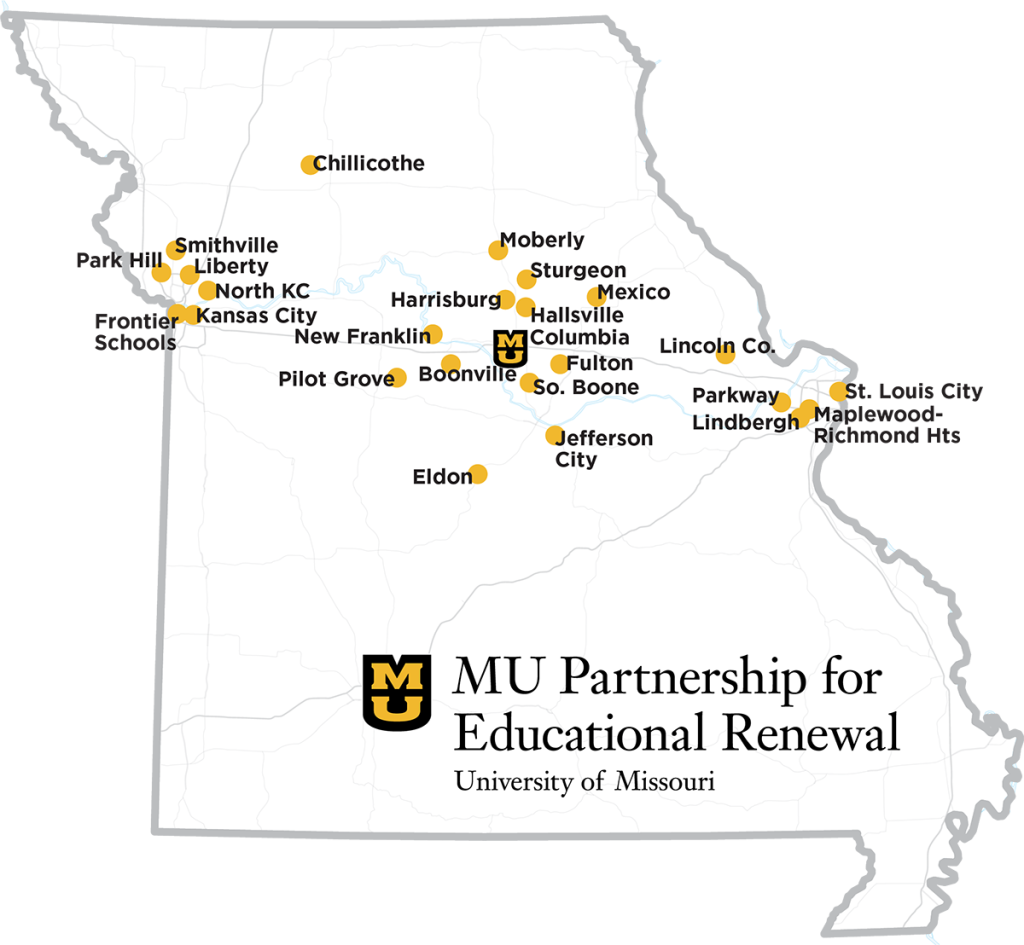
The MU Partnership for Educational Renewal strives to prepare, support, and motivate professional educators to assure the learning of all students.
The MU Partnership for Educational Renewal (MPER) was established with the purpose of connecting pre-K-12 schools with universities in an ongoing, collaborative relationship in order to achieve equal access to knowledge for all students. At the heart of this partnership is a desire for the continuous improvement and renewal of both public education and the MU educator preparation program. Through networking, support, professional development, and research opportunities, MPER strives to help member school districts realize their state and local goals.
MPER’s members are a consortium of representatives from Missouri school districts, MU Colleges of Education & Human Development and Arts and Sciences, the Missouri Department of Elementary and Secondary Education (DESE), Moberly Area Community College and State Fair Community College. Members meet regularly to work together to promote the best in research-based strategies that will increase learning outcomes for all and ensure effective teacher education.
MPER was established in 1994 by a group of superintendents from Missouri School districts, deans of the MU College of Education & Human Development and the MU College of Arts and Science, and MU faculty members who were interested in forming a partnership between public and higher education. MPER is based on the research of John Goodlad, an influential educational researcher and author who championed models for school and teacher education renewal.
MPER Programs
- Mental Health Leadership Academy
- Two sessions are held each year, providing tools for school leaders to be more effective in addressing mental health issues impacting student achievement and health.
- Teacher Preparation and the Office of Field Experiences
- MPER members receive priority access with MU’s student teacher candidate and preservice teacher programs
- Senior Year On-Site Program (elementary) and Secondary Teacher Candidates: In the Senior Year On-Site Program (SYOSP), all MU elementary education majors participate in a full year on-site experience during their senior year in an MPER district. Secondary teacher candidates do their student teaching in an MPER district in the fall or spring semester.
- Field Experiences: The Teacher Education Program allows preservice teachers to observe first-hand teaching techniques and strategies and apply learning and instructional theories in classroom environments in MPER districts.
- MPER members receive priority access with MU’s student teacher candidate and preservice teacher programs
- MPER Early Career Scholars Program
- The MPER Early Career Scholars Program is a revised version of the MU Teaching Fellowship Program which is an outstanding instructional and support system for full-time teachers hired by MPER member districts who work with local mentors learning the nuances of teaching while completing a graduate degree.
- Research Funding
- MPER provides support and funding for study groups in member school districts. Learn more about Study Group Funding and how to apply.
- College of Education Faculty
MPER Leadership
MPER is governed by a board composed of the Superintendent from each member school district, a representative from community colleges approved for membership, the Dean of the College of Education & Human Development, the Dean of the College of Arts and Sciences, and the Missouri Commissioner of Education. The Governing Board is responsible for all policy decisions, oversees financial affairs, provides direction to co-directors, creates agendas, monitors projects, and continually facilitates the introduction of new programs.
The MPER Operations Council consists of partner school personnel, College of Education & Human Development Faculty, College of Arts & Science Faculty, Community Colleges Faculty, a representative from the Department of Elementary & Secondary Education, and MPER office staff. The Operations Council is responsible for the implementation of MPER programs and decisions on operational issues.
Learn more:
MPER Membership
MPER Partner School Districts and University educators work together to achieve a common goal of simultaneous renewal of education. They work collaboratively toward four objectives:
- Educating children and youth
- Preparing school professionals and future educators
- Providing ongoing professional development for practicing educators
- Engaging in inquiry and action research centered on the discovery, development, demonstration, and dissemination of best practices in teaching and learning
Such renewal embraces both ongoing improvement of practice and the preparation of new generations of school professionals.
MPER Partner School Districts are grouped into four tiers according to their size:
- Tier I: student populations between 7,000 and 44,000
- Tier II: student populations between 1,651 and 6,999
- Tier III: student populations between 601 and 1650
- Tier IV: student populations between 1 and 600

